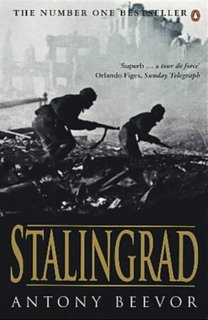
So much has been published about Stalingrad, but I certainly never get tired of it. This author supposedly had access to previously-unavailable archives in both Russia and Germany. Beever goes into quite a bit of battle detail, but focuses more on the “way it felt” for attackers, defenders, civilians. Many quotations from letters and diaries. Some of the letters were from German soldiers and were in Russian archives after the Russian victory; the Nazi censors wouldn’t have allowed them to reach Germany.
The story is pretty familiar. Nazis sweep across southern Russia, but too late to polish off Stalingrad in 1941. Luftwaffe levels the city, unintentionally making a great defensive zone for the Russians. Russians make a stand in Stalingrad. Often the defenders’ morale was bolstered by commissars standing behind them with pistols, shooting anyone who flinched. Building-by-building, floor-by-floor fighting. Snipers. Civilians (including children) surviving in the rubble, with techniques like crawling out at night to take the “bread bag” off dead Russian soldiers. Horrific winter weather. Cruelty to prisoners – but what to do when fighting men lacked shelter and food? Lice. No fuel on the steppes. Minimal care for numerous wounded.
He describes how the Russians encircle the Germans – who flipped from being on the verge of winning to starved and frozen encirclement in the Kessel. The ineffectual air bridge bringing in hopelessly inadequate supplies. Russians fighting in German uniform (probably with more motivation than even the Germans, as the Russians closed in). Hitler’s interference in military matters. Propagandists on both sides. Christmas in the Kessel, as starving soldiers saved bits of bread to give as gifts to celebrate Christmas “in the German way.” A German artist drawing the “Fortress Madonna” for Christmas on the back of a captured Russian map (there being no other paper).
The book wears you down. Just unbelievable what happened here.
More info on the battle can be found here.
No comments:
Post a Comment